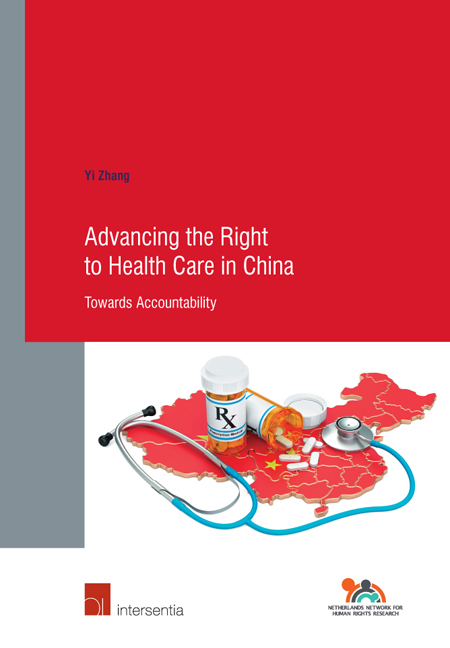Book contents
- Frontmatter
- Dedication
- Acknowledgements
- Contents
- List of Abbreviations
- Chapter 1 General Introduction
- Part 1 The Implementation of the Right to Health (Care) – An Analysis of China's Practice
- Part 2 An Analytical Framework for Right to Health-based Accountability
- Chapter 5 An Overview of Right to Health-based Accountability
- Chapter 6 Accountability Mechanisms for the Realisation of the Right to Health (Care)
- Part 3 Advancing the Right to Health Care in China - Towards Accountability
- Annexes
- List of Instruments
- United Nations Documents
- List of Tables and Figures
- Samenvatting
- Selected Bibliography
- Index by Paragraph
- Curriculum Vitae
- Human Rights Research Series
Chapter 5 - An Overview of Right to Health-based Accountability
from Part 2 - An Analytical Framework for Right to Health-based Accountability
- Frontmatter
- Dedication
- Acknowledgements
- Contents
- List of Abbreviations
- Chapter 1 General Introduction
- Part 1 The Implementation of the Right to Health (Care) – An Analysis of China's Practice
- Part 2 An Analytical Framework for Right to Health-based Accountability
- Chapter 5 An Overview of Right to Health-based Accountability
- Chapter 6 Accountability Mechanisms for the Realisation of the Right to Health (Care)
- Part 3 Advancing the Right to Health Care in China - Towards Accountability
- Annexes
- List of Instruments
- United Nations Documents
- List of Tables and Figures
- Samenvatting
- Selected Bibliography
- Index by Paragraph
- Curriculum Vitae
- Human Rights Research Series
Summary
INTRODUCTION
Part 2 of this study (chapters 5 and 6) offers, through the lens of accountability, a possible solution to the remaining challenges confronting China in its implementation of the right to health care. Accountability gives ‘teeth’ to human rights; it can be a powerful tool for promoting the right to health (care). Nevertheless, and despite the growing body of literature recognising its importance for advancing the right to health (care), accountability remains under-specified throughout human rights scholarship.
The purpose of chapter 5 is twofold. First, it aims to refine the concept of accountability (which remains an elusive concept in several disciplines) from a human rights perspective. One of the unique contributions of the right to health framework is that it provides a rather objective and comprehensive framework for accountability. The norms and standards under the right to health (care) provide a compelling normative framework for defining human rights-based accountability and for developing effective accountability mechanisms to advance the right to health (care). Although still subject to progressive realisation, the right to health (care) gives rise to a range of core obligations of immediate effect, including an obligation to establish effective, transparent, accessible and independent mechanisms for accountability.
The second purpose of this chapter is to explore how accountability can advance the right to health (care) at the domestic level. Accountability is vital to human rights implementation, because it reinforces the realisation of the right to health (care) by providing right-holders with an opportunity to call into question how State (and other relevant) actors have discharged their obligations under the right to health (care). In addition, it enables right-holders to hold responsible actors to account when they have failed to comply with their obligations. Likewise, it also provides duty-bearers with the opportunity to inform right-holders about what they have done to achieve the full realisation of the right to health (care), and explain and justify their reasons for it. Where violations of the right to health (care) have occurred, accountability implies the possibility of imposing consequences on responsible duty-bearers, including eventual sanctions where relevant. Additionally, accountability allows victims of violations of the right to health (care) to claim remedies. Importantly, right to health-based accountability is more than finding fault, imposing punishment, and seeking remedies. Rather, it is a process that comprises a range of elements, including monitoring, rectification, access to a remedy and public participation, among others.
- Type
- Chapter
- Information
- Advancing the Right to Health Care in ChinaTowards Accountability, pp. 189 - 220Publisher: IntersentiaPrint publication year: 2018

